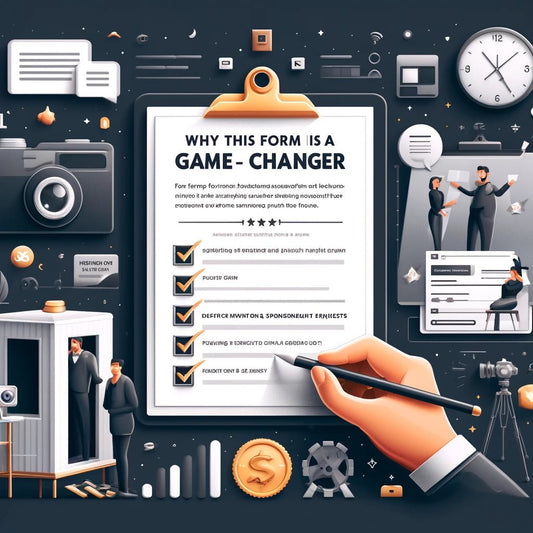
Ultimate Guide to Corporate Event Planning: Tips, Ideas, and Strategies
Share
.jpg)
"Corporate event planning plays a crucial role in the success of corporate events, from conferences and seminars to product launches and team-building activities. It involves meticulous planning and coordination to ensure that the event meets its objectives and leaves a lasting impression on attendees. Corporate event planning also encompasses considerations such as budget management, venue selection, guest list creation, and schedule development.
Objectives of corporate event planning vary depending on the specific event, but common goals include increasing brand visibility, fostering client relationships, promoting employee engagement, and driving business growth.
To ensure a successful corporate event, various key considerations must be taken into account. These include catering and menu selection to satisfy attendees' culinary preferences, entertainment and activities to engage and entertain guests, event marketing and promotion to generate buzz and attract attendees, logistics and event setup to create a seamless and enjoyable experience, and safety and security measures to prioritize the well-being of all participants.
However, corporate event planning is not without its challenges. Some common obstacles include tight timelines, limited budgets, coordinating with multiple stakeholders, addressing technological needs, and adapting to unforeseen circumstances. By anticipating and addressing these challenges, event planners can overcome obstacles and deliver outstanding corporate events."
Why is Corporate Event Planning Important?
Corporate event planning is crucial for businesses as it helps create a positive and lasting impression among clients, employees, and stakeholders. Organizing successful corporate events allows companies to showcase their brand identity, promote products or services, and strengthen relationships. The planning process ensures that events run smoothly, with attention to detail and logistical considerations. By carefully coordinating aspects such as venue selection, catering, and entertainment, businesses can create memorable experiences for attendees. Effective corporate event planning demonstrates professionalism, enhances credibility, and facilitates networking opportunities, ultimately leading to business growth and success.
Corporate event planning is important because it helps businesses create a positive and lasting impression among clients, employees, and stakeholders. Organizing successful corporate events allows companies to showcase their brand identity, promote products or services, and strengthen relationships. The planning process ensures that events run smoothly, with attention to detail and logistical considerations. By carefully coordinating aspects such as venue selection, catering, and entertainment, businesses can create memorable experiences for attendees. Effective corporate event planning demonstrates professionalism, enhances credibility, and facilitates networking opportunities, ultimately leading to business growth and success.
What are the Objectives of Corporate Event Planning?
What are the Objectives of Corporate Event Planning?
The objectives of corporate event planning are to create a successful and memorable event that aligns with the company's goals and objectives. This includes:
1. Enhancing brand image and reputation: Corporate events provide an opportunity to showcase the company's values and create positive associations with the brand.
2. Building relationships: Events allow for networking and relationship-building with clients, stakeholders, and employees.
3. Increasing employee engagement and morale: Well-planned events can boost employee morale, improve team dynamics, and foster a sense of belonging.
4. Generating leads and business opportunities: Corporate events can attract potential clients, generate leads, and create business opportunities.
5. Promoting knowledge sharing and learning: Events can be used as a platform to share knowledge, provide training, and facilitate professional development.
By focusing on these objectives, corporate event planning can contribute to the overall success and growth of the company.
Steps in Corporate Event Planning
When it comes to planning a successful corporate event, there are several key steps that can make all the difference. From defining your event goals and establishing a budget to choosing the perfect venue and creating a guest list, each sub-section plays a crucial role in ensuring a seamless experience. And let's not forget about developing a well-thought-out schedule and timeline, which is essential for keeping everything on track. So, let's dive into these steps and discover how they come together to create an unforgettable corporate event.1. Defining the Event Goals and Objectives
Defining the goals and objectives of a corporate event is crucial for its success. It sets the direction and purpose of the event, guiding all planning and decision-making processes. To define the event goals and objectives effectively, consider the desired outcomes and what you hope to achieve. For example, goals could include improving brand awareness, increasing employee engagement, or networking with industry professionals. Objectives should be specific, measurable, achievable, relevant, and time-bound (SMART), serving as the roadmap to success. By clearly defining the event goals and objectives, you can ensure that all event elements, such as budget, venue, guest list, schedule, and logistics, align with the desired outcomes.
In 1961, President John F. Kennedy set an ambitious goal for the United States: to land a man on the moon before the end of the decade. With clear event goals and objectives, NASA worked relentlessly to achieve this monumental task. On July 20, 1969, the Apollo 11 mission successfully accomplished the objective, as Neil Armstrong became the first person to set foot on the moon, fulfilling a dream that had been defined years earlier. This historic event showcases the power of defining clear event goals and objectives in achieving remarkable feats.
2. Establishing a Budget
- Establish clear financial goals for the event.
- Identify all potential expenses, including venue rental, catering, entertainment, and marketing.
- Research and obtain quotes from vendors to accurately estimate costs.
- Allocate funds to different aspects of the event based on priority.
- Consider contingency funds for unexpected expenses.
- Monitor and update the budget throughout the planning process.
- Communicate the budget to all stakeholders to ensure transparency and manage expectations.
By following these steps, you can successfully establish a budget for corporate event planning that aligns with your company's financial resources and event objectives.
3. Choosing the Right Venue
When it comes to corporate event planning, choosing the right venue is crucial for the success of the event. Here are some key considerations to keep in mind:
- Capacity: Ensure that the venue has enough space to accommodate all the guests comfortably.
- Location: Select a venue that is convenient for attendees and has easy access to transportation.
- Amenities: Consider the amenities offered by the venue, such as audiovisual equipment, parking facilities, and Wi-Fi connectivity.
- Ambiance: Assess the atmosphere and decor of the venue to ensure it aligns with the event's theme or purpose.
- Catering Options: Check if the venue offers in-house catering services or allows external caterers.
By carefully evaluating these factors, you can make an informed decision and choose the right venue for your corporate event.
4. Creating a Guest List
Creating a guest list is a vital step in corporate event planning. It is crucial to ensure that the right people are invited and that the event achieves its objectives. Here are some steps to consider when creating a guest list for a corporate event:
- Identify the target audience: Determine who the event is intended for, such as clients, business partners, or employees.
- Set guest criteria: Define specific criteria, such as job titles, industry, or level of seniority, to ensure the right attendees.
- Research and gather contact information: Use professional networks, databases, or CRM systems to gather contact details of potential guests.
- Consider guest limit and event space: Take into account the capacity of the venue and consider any restrictions on the number of attendees.
- Send out invitations: Craft personalized invitations and send them out well in advance, providing clear RSVP instructions.
In the early 1900s, Emily Post revolutionized the concept of creating a guest list by introducing formal etiquette for events. This included guidelines for seating arrangements, invitation precedence, and creating a balanced mix of guests from various backgrounds. Her influential book, "Etiquette in Society, in Business, in Politics, and at Home," laid the groundwork for modern guest list protocols. Today, creating a guest list remains a fundamental aspect of successful corporate event planning.
5. Developing a Schedule and Timeline
Developing a schedule and timeline is a crucial aspect of corporate event planning. It ensures that all the necessary tasks are completed on time and helps to maintain organization throughout the planning process. Here are the steps involved in developing a schedule and timeline:
1. Identify the key milestones and deadlines for the event.
2. Break down the tasks that need to be completed into smaller, manageable segments.
3. Assign specific deadlines and responsibilities to team members for each task.
4. Allocate sufficient time for tasks that require more effort or coordination.
5. Consider any dependencies or interdependencies between tasks.
6. Create a visual timeline or Gantt chart to track the progress of each task and ensure that everything is on schedule.
By following these steps, you can effectively develop a schedule and timeline that will help you stay organized and ensure a successful corporate event.
Key Considerations in Corporate Event Planning
When it comes to corporate event planning, there are several key considerations that can make or break the success of your event. From the crucial elements of catering and menu selection to the exciting aspects of entertainment and activities, each sub-section plays a vital role in creating a memorable experience. Event marketing and promotion, logistics and event setup, and ensuring safety and security measures are in place are essential for the smooth execution of any corporate gathering. Let's dive into these key considerations and uncover the secrets of planning a truly remarkable event.1. Catering and Menu Selection
When it comes to catering and menu selection for corporate event planning, it is crucial to consider various factors. Providing delicious and high-quality food options is essential in order to ensure a successful event. The table below showcases the key aspects of catering and menu selection:
| Considerations | Details |
|---|---|
| Dietary Restrictions | Accommodate various dietary needs such as vegan, gluten-free, etc. |
| Menu Variety | Offer a diverse range of dishes to cater to different preferences. |
| Quality of Ingredients | Ensure that only fresh and high-quality ingredients are used. |
| Presentation | Present the food beautifully to enhance the overall experience. |
| Service Style | Choose between buffet, plated meals, or food stations. |
| Budget | Determine the budget for catering and stay within the limits. |
By considering these factors, event planners can ensure that attendees have an enjoyable dining experience that aligns with their expectations.
2. Entertainment and Activities
To ensure a successful corporate event, entertainment and activities are of utmost importance in engaging attendees and creating a memorable experience. Here are some key considerations when planning entertainment and activities:
Determine the event theme and objectives to align entertainment choices.
Research and book entertainment options such as live music, DJs, or performers that fit the event atmosphere.
Offer a variety of activities to cater to different interests, such as team-building exercises, interactive games, or workshops.
Consider incorporating technology and interactive elements like VR experiences or photo booths to enhance attendee engagement.
Ensure a smooth flow of activities by coordinating schedules, transitions, and managing any technical requirements.
By carefully selecting and planning entertainment and activities, corporate events can captivate attendees and leave a lasting impression.
3. Event Marketing and Promotion
- Event Marketing and Promotion is an essential component of corporate event planning. It plays a significant role in creating awareness and generating excitement for the event, which ultimately leads to maximum attendance and engagement.
- To ensure successful event marketing, it is crucial to define your target audience. This involves identifying the specific group you want to attract to the event, considering their demographics and interests.
- Developing a comprehensive marketing strategy is another key consideration. This includes creating a detailed plan outlining promotional activities, such as social media campaigns, email marketing, and forming partnerships.
- Create compelling content that effectively showcases the value of the event. Craft engaging and informative content that highlights key speakers, sessions, and the unique experiences attendees can expect.
- Utilize multiple channels to promote the event. This involves leveraging various platforms, including social media, industry-specific websites, newsletters, and press releases.
- Offer incentives to encourage early registration or referrals. Consider providing special discounts, exclusive perks, or giveaways to entice potential attendees.
- Ensure you track and analyze results to measure the effectiveness of your marketing efforts. Keep an eye on metrics such as website visits, social media engagement, and ticket sales to understand the impact of your strategies.
4. Logistics and Event Setup
The logistics and event setup play a critical role in corporate event planning. Giving attention to detail and efficient coordination is key to guarantee a smooth and successful event. Here are some crucial considerations:
The Corporate event planning provides helpful tips and strategies to plan a successful corporate event.
1. Equipment and Supplies: It is essential to make arrangements for audiovisual equipment, furniture, decor, and other necessary supplies well in advance.
2. Layout and Design: Carefully plan the layout of the venue, including seating arrangements, stage setup, and interactive areas.
3. Signage and Branding: Promote brand visibility throughout the event by displaying clear signage to guide attendees.
4. Technical Support: Ensure seamless technical execution by coordinating with technicians for sound, lighting, and IT support.
5. Transportation and Parking: Arrange transportation for attendees and provide convenient parking facilities.
Fact: Effective logistics and event setup can significantly enhance attendee satisfaction and overall event experience.
5. Safety and Security Measures
When it comes to corporate event planning, ensuring safety and security measures are in place is crucial. Here are some key considerations to keep in mind:
- Designate a security team or hire professional event security personnel to manage access control and monitor the event.
- Implement emergency evacuation plans and conduct drills to ensure the safety and security of attendees in case of any unforeseen incidents.
- Secure the venue by conducting thorough background checks on vendors and service providers, ensuring they have proper certifications and licenses.
- Install surveillance cameras and have a contingency plan for any technical issues that may arise.
- Provide clear communication channels for reporting any safety concerns or emergencies.
These safety and security measures will help create a safe and secure environment for everyone attending the corporate event.
Common Challenges in Corporate Event Planning
Planning corporate events can be a daunting task due to the various factors that can arise. It is essential to be knowledgeable about the common challenges that come with corporate event planning. Here are some obstacles to keep in mind:
- Budget constraints: Limited budgets can pose restrictions when considering venues, entertainment, and catering options.
- Tight timelines: Planning an event within a short timeframe can create stress and limit the availability of preferred vendors.
- Coordination: Coordinating with multiple stakeholders, including speakers, sponsors, and vendors, can be a complex and time-consuming process.
- Logistics: Managing logistics such as transportation, accommodation, and audiovisual equipment requires meticulous organization and attention to detail.
- Communication: Ensuring effective communication among team members, clients, and attendees is crucial for the smooth execution of the event.
- Unforeseen circumstances: Dealing with unexpected challenges like technical glitches, weather conditions, or last-minute cancellations demands adaptability and quick problem-solving skills.
Being aware of these common challenges and addressing them proactively can help mitigate risks and ensure the success of your corporate event. For more information on corporate event planning, you can refer to the Corporate Event Planning Guide.
Frequently Asked Questions
1. What are the different types of corporate events?
The different types of corporate events include conferences and seminars, trade shows, team-building events, product launches, networking events, client entertaining, and charity fundraising days.
2. How can corporate events strengthen bonds and promote a brand?
Corporate events provide an opportunity to build lasting relationships and create genuine connections with clients and employees. In-person communication at these events is more effective than online messages, and they can be designed as interactive brand experiences that are meaningful and engaging, thus promoting brand recognition and loyalty.
3. What are the goals for corporate events?
The goals for corporate events can vary and may include celebrating wins, motivating staff, generating leads, promoting the brand, improving employee retention, and providing employee training.
4. What is the ultimate corporate event planning checklist?
The ultimate corporate event planning checklist should include setting goals, determining logistics (such as date, format, and location), creating a budget, developing a marketing plan, selecting vendors and suppliers, managing registrations and RSVPs, coordinating event logistics, and evaluating the event's success.
5. How can companies attract future clients through professional events?
By hosting professional events like conferences, seminars, and networking events, companies can attract future clients by showcasing their expertise, building relationships, and creating favorable business outcomes. These events can also serve as wider marketing initiatives.
6. Why is it important to define goals and objectives before planning a corporate event?
Defining goals and objectives is crucial because it helps determine the purpose, structure, and content of the event. This ensures that the event is aligned with the company's growth strategy, internal company behavior, and senior leaders' expectations.






